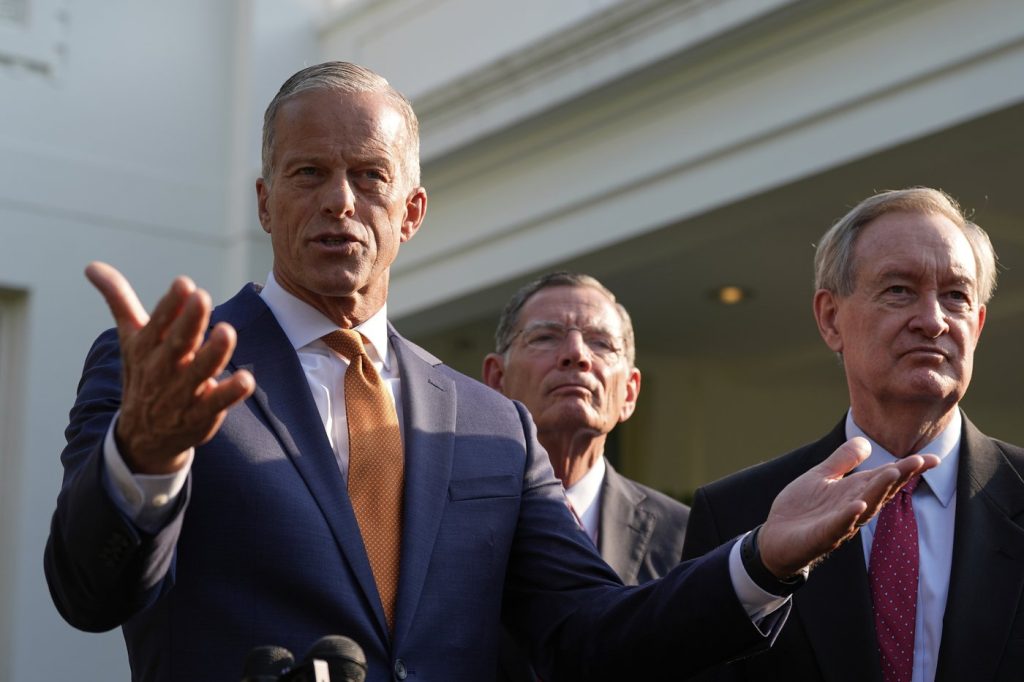WASHINGTON (AP) — Senate Majority Leader John Thune, just six months into his leadership role, is confronted with a significant challenge: pushing President Donald Trump's extensive tax and spending cuts package through a divided GOP conference. With a firm Republican opposition looming, Thune can afford to lose no more than four votes amidst unified Democratic resistance. However, he faces criticism from multiple Republican senators regarding the version of the bill that the House has sent over.
Meeting the July 4 deadline set by Trump adds urgency to Thune's task. The Senate Majority Leader must adeptly reconcile various and often conflicting demands from his fellow senators without alienating the Republican support in the House, which narrowly approved the legislation by a single vote last month after intense negotiations. This complex and precarious undertaking is likely to shape the first year of Thune's tenure and influence his evolving relationship with Trump.
North Carolina Senator Thom Tillis emphasizes that Thune's leadership will be critical in these trying times. He remarked, "You can say no all you want, as long as you don’t say no to the wrong 51 people." So far, Thune has maintained a positive rapport with both his colleagues and the White House. Despite past tensions with Trump towards the end of his first term, Thune has been navigating his leadership with a focus on fostering collaboration and listening to objections from within the party.
Thune's approach has included individual meetings with senators to gather their input, a strategy welcomed by many in the GOP. This interpersonal outreach starkly contrasts with the leadership style of his predecessor, Mitch McConnell, who was perceived as more imposing and less accessible. Senator Kevin Cramer of North Dakota noted that this change in approach has made many senators feel more valued. Florida Senator Rick Scott, who previously clashed with McConnell, appreciates Thune's willingness to listen, believing it increases the likelihood of support for the legislation.
While the Senate has plans to revise the bill to address concerns over changes to Medicaid and other programs, Thune insists that "failure is not an option." He acknowledges the criticisms surrounding individual aspects of the bill but emphasizes the necessity of achieving success. Thune’s engagement with Trump has been instrumental in maintaining communication and cooperation on the legislation amid a challenging political landscape.
Thune's swift move to advance Trump’s Cabinet nominations without significant controversy has garnered praise from his colleagues. Additionally, he has effectively dealt with procedural challenges, such as delaying a vote on California air regulations to accommodate concerns from more moderate Republican senators. Such actions are contributing to his image as a unifying force within the party, building goodwill among senators eager for collaborative leadership.
Significantly, Thune has implemented time-saving measures in Senate voting procedures, reducing lengthy vote durations to 15 minutes, which has proven to be both a learning curve and a respect-building endeavor among senators. His colleague, Mike Rounds, remarked on Thune's ability to enforce new policies while still earning respect and support from his peers, a balancing act that illustrates the challenges of Senate leadership.
Yet, as Thune continues to adapt and adjust to his new role, he is aware that passing the tax bill requires tough decisions, with no assurance that all senators will agree. As he navigates these turbulent waters, Thune's ability to maintain a working relationship with the Republican conference, the House, and Trump will be vital for achieving legislative success in a heavily polarized political environment.










